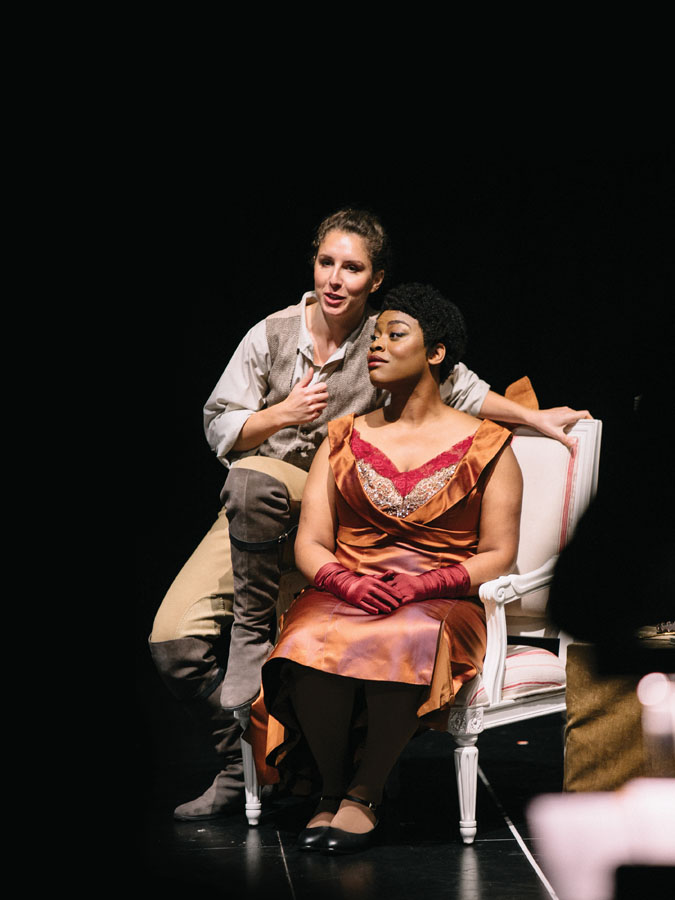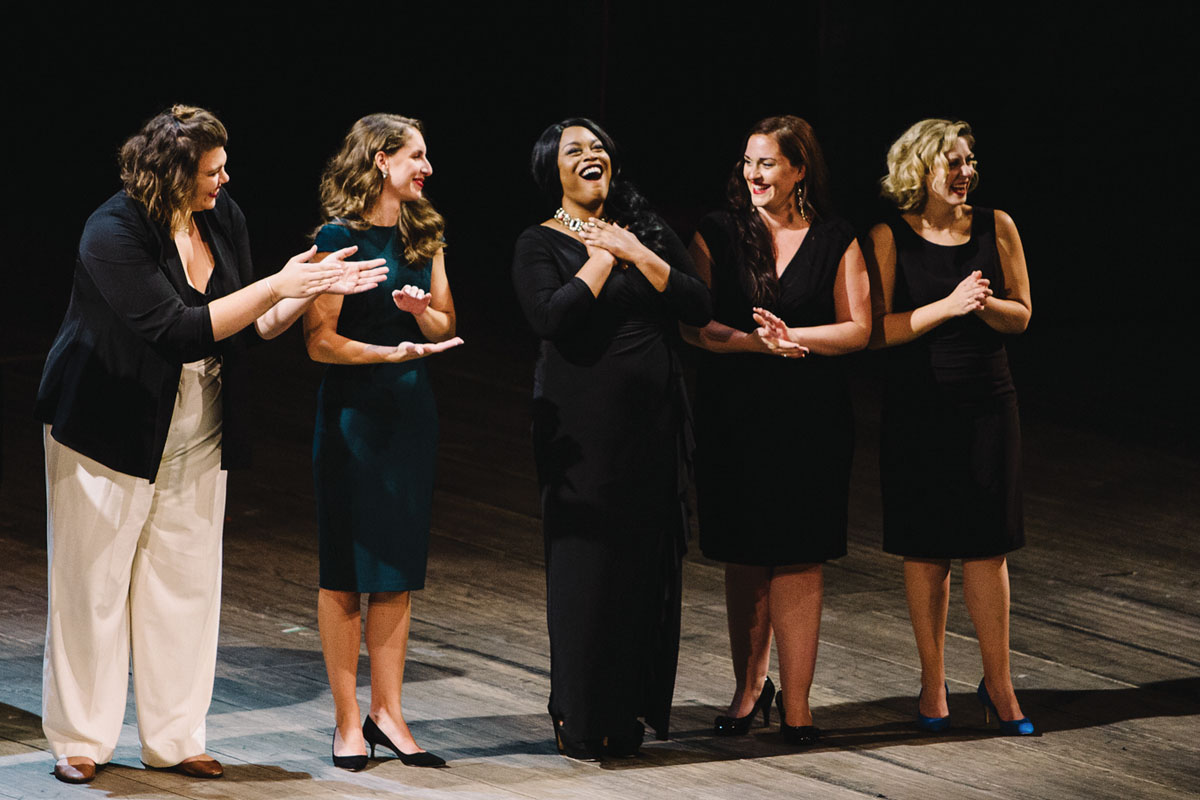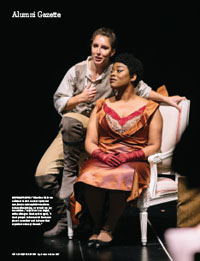Alumni Gazette
 MOVING PEOPLE: “Whether it’s from a distant state to a more present one, from contemplative sadness to inexplicable joy, or even from joy to sadness,” says Morrison (right, with colleague Lindsay Metzger), “I want people to be moved from one place to another and to know that experience was profound.” (Photo: Jaclyn Simpson/Courtesy of Ryan Opera Center)
MOVING PEOPLE: “Whether it’s from a distant state to a more present one, from contemplative sadness to inexplicable joy, or even from joy to sadness,” says Morrison (right, with colleague Lindsay Metzger), “I want people to be moved from one place to another and to know that experience was profound.” (Photo: Jaclyn Simpson/Courtesy of Ryan Opera Center)Soprano Whitney Morrison ’15E (MM) makes her debut this fall at one of the most prominent houses in opera. Morrison will take the stage as Countess Ceprano in Lyric Opera of Chicago’s production of Verdi’s Rigoletto.
Morrison was assigned the role by wowing audiences at the final auditions of Lyric’s Patrick G. and Shirley W. Ryan Opera Center, a leading training ground for rising stars in opera, where she has been a student since 2015.
“This is a truly fortunate position to be in,” she says.
The production, which launches in October, is one of several operas in which Morrison has been cast since being selected for the audience-development program at the final auditions last fall, where she also received the Audience Favorite Award.
After Rigoletto, she will take the stage this fall as Gerhilde in Lyric’s production of Wagner’s Die Walkure. She’s also slated to be an understudy for Liu in Puccini’s Turandot and Marguerite in Gounod’s Faust.
Considered one of Verdi’s masterpieces, Rigoletto revolves around licentious machinations in the court of the Duke of Mantua. As Countess Ceprano, Morrison plays a key figure in the drama. She describes the role as concise and uncomplicated, but she says one of the challenges is managing the mayhem around her during festive ball and court scenes.
As a high school student, Morrison saw a production of Carmen in the same Lyric auditorium, a memory that has added to her excitement about appearing on the opera house’s noted stage. That excitement has been tempered a bit by the realization of the work that goes into such productions.
“I’m more sober-minded than I expected to be at this stage in the game,” she says. “This is a premier program at a top-level house, a great opportunity, and now that I’m here, I simply approach each task as another day’s work. At this point I’m focusing my energy into being as prepared as possible.”
 AUDIENCE ADMIRATION: Morrison won the Audience Favorite Award at the final auditions last fall as part of Lyric Opera of Chicago’s program for rising opera singers. (Photo: Jaclyn Simpson/Courtesy of Ryan Opera Center)
AUDIENCE ADMIRATION: Morrison won the Audience Favorite Award at the final auditions last fall as part of Lyric Opera of Chicago’s program for rising opera singers. (Photo: Jaclyn Simpson/Courtesy of Ryan Opera Center)Morrison received a bachelor’s degree in vocal performance and pedagogy at Oakwood University in Alabama before earning a master’s degree in performance and literature from the Eastman School of Music.
Her theory training at Eastman helped give her the tools to digest new musical scores quickly, something she had to do for a production of Mozart’s Don Giovanni.
“The boost in musicianship—that additional emphasis on form, being able to break down music into smaller parts, being able to overlook the long journey of where it’s going—has been very helpful,” she says.
She continues with voice lessons and language classes, studying in part with the voice teacher she has had since late 2015, Julia Faulkner, director of vocal studies at the Ryan Opera Center. Also playing a role with the program is world-renowned soprano Renée Fleming ’83E (MM), who serves as an advisor to the center.
Steven Daigle, artistic director of Eastman Opera Theatre, remembers Morrison as a passionate and studious singer. “I’m not surprised she is succeeding,” he says.
Kathryn Cowdrick, a professor of voice at Eastman, recalls Morrison as having “a large, beautiful, warm voice, and very often this type of instrument takes more time to mature, to get control of technically and to come in to its bloom, sort of like a fine wine. She worked diligently to refine her foreign languages and was very dedicated to her faith and the music of African-American composers, which she generously shared in her recital work here.”
Morrison, who grew up singing gospel music in church, has crafted a philosophy around her singing influenced by that faith.
“It is the idea that all of life is connected. Who you are, what you think, how you treat people, and how you move through the world influences what you do at a given moment,” she says, “so that when you come to a performance moment, it will be full, honest, and genuine.” No matter the role, she wants her listeners to be transported.
“Whether it’s from a distant state to a more present one, from contemplative sadness to inexplicable joy, or even from joy to sadness,” she says, “I want people to be moved from one place to another and to know that experience was profound.”
Robin L. Flanigan is a Rochester-based freelance writer.

